One must know why does my cat’s breath stink! A cat’s breath isn’t exactly supposed to smell like a wreath of roses, but it doesn’t mean that you start retching up when your tomcat yawns in your face early in the morning.
For cat pet owners, one of the more common complaints about their cat is bad breath. Take a loving sniff from your cat’s mouth, and if that makes you wince hard, chances are something may be wrong with your cat.
And a cat with a breath that smells worse than a rotting dungeon can get anyone wondering — why does my cat’s breath stink?
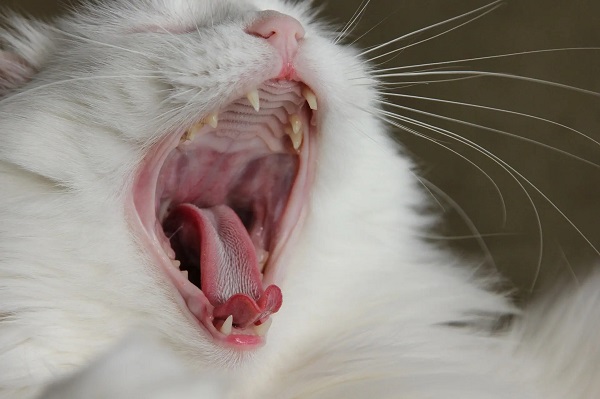
What Can Cause Stinking Breath in Cats?
While it is not necessarily uncommon for cats to have a little strange odor in their breath, but if it starts giving off a stench that of rotting meat, something’s amiss.
As per Medicine Net, “Persistent bad breath can also indicate more serious medical problems such as abnormalities in the mouth, respiratory system, gastrointestinal tract, liver or kidneys.“[1]
Beyond your cat’s stinking breath, there could be underlying factors that could be contributing to this strange, unpleasant smell from her mouth.
And there are myriads of reasons behind the stinking cat’s breath, with one of the most minor being your cat’s diet.
Is It Your Cat’s Diet?
If you notice that your cat’s breath is smelling bad, one of the primary reasons could be her diet. Yes, dietary issues can also lead to a bad smell. Some foods that can cause a stinking breath in cats can be fish or chicken liver-based ingredients.
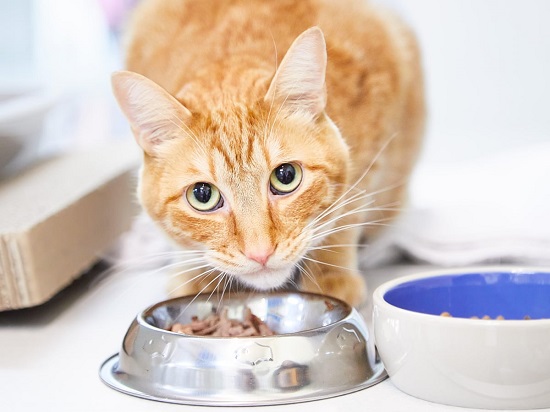
If you feed a lot of fish to your cat, then the fishy burps can be the prime reason causing the unpleasant-smelling breath. Likewise, a poor cat diet with additives and hard-to-digest foods can also be the reason behind the smell.
Whereas, a normal and healthy cat diet will not contribute to any bad cat breath.
There Is Some Food Stuck in Her Mouth
If it isn’t your cat’s diet, then it can be the food stuck in her mouth. The stuck food in the teeth can start decaying, giving off an unpleasant smell.
Apart from that, cats may also chew on random objects like rubber bands or wires, resulting in particles getting stuck in their mouth. The problem is easy to solve; you need to keep tabs on what your cat is eating. Make sure there are no foreign particles lodged in her mouth.
Tooth brushing can be the best option, but it requires practice and patience. Brushing your cat’s teeth can remove plaque and tartar buildup, and also reduce the chances of gum inflammation. It can easily treat the problem of bad breath as well.
Gastrointestinal Issues
Gastrointestinal problems in cats such as vomiting and diarrhea can also lead to bad-smelling breath. This kind of breath may smell more like cat poop.
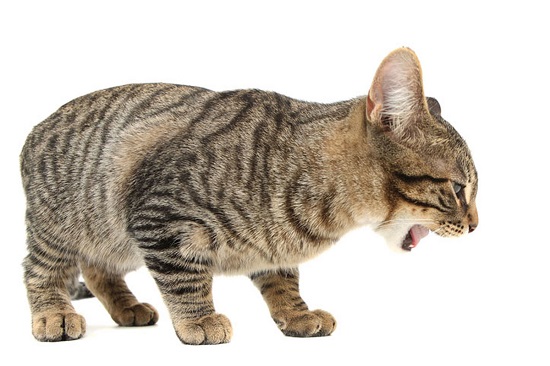
Intestinal blockage or bowel obstruction is one such problem that requires immediate medical attention. And if you are concerned that your cat may have ingested any foreign object such as a toy or something, you should watch out for such symptoms.
Assume the worst and call your vet if you think your cat is having problems with bowel removal.
Kidney Disease
In addition to the above causes, serious health problems such as kidney disease. It is a more common cause in older cats. With decreased kidney function, things like urea, ammonia, waste products, toxins can build up in the blood and cause bad breath in cats.
Further, the breath may smell like urine — which is a symptom of kidney disease. Other symptoms can include lethargy, weight loss, loss of appetite, and increased urination.
Gingivitis and Stomatitis
Gingivitis refers to the inflammation of the gums, and Stomatitis refers to the inflammation of the mucous linings in the cat’s mouth.
Felines tend to develop such conditions, typically because of any underlying dental disease, but also sometimes because of other bacteria, allergies, and viruses.
In case it is left untreated, the inflammation of the gums and other oral health problems can give rise to more problems in other parts of the cat’s body — including kidney disease, intestinal blockages, and liver disease.
Diabetes Mellitus
Diabetes mellitus is a disease related to the pancreas. In simple words, it is a failure of pancreatic cells to maintain blood sugar in cats. It can give rise to a different sort of breath.
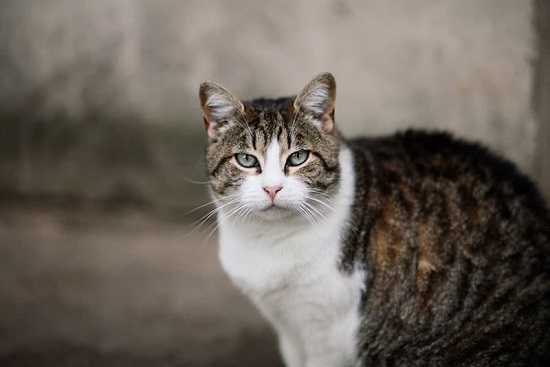
You may notice a fruity or sweet smell from your cat’s mouth, especially if your cat is drinking water and urinating more than often, and also losing weight despite having a heavy appetite.
This can be a sign of ketoacidosis, which is a complication of diabetes and a potentially life-threatening condition.
Does She Have a Dental Disease?
Several things can lead to bad breath in cats. But vets agree that dental diseases in cats be the most common culprit. For the most part, odor-producing bacteria building up in your cat’s mouth will be most likely be the major cause of your cat’s unpleasant breath.
The saliva and bacteria from the accumulated plaque can then decompose and become tartar if the condition is not treated. Whereas other dental diseases, such as periodontal disease, which is an infection that is caused by the build-up of soft dental plaque and tartar on the surfaces of the teeth around the gums of cats. It is also the most common cause of halitosis in cats.
This is a serious issue, it can lead to tooth loss, bleeding gums, pain, and also other problems in cats. On the other hand, dental health care is often neglected in cats. Poor oral hygiene can not only lead to bad breath but also other dental problems.
You can prevent further tooth decay.
By paying close attention to your kitty’s breath as well as properly cleaning her teeth.
It Can Be Mouth Cancer?
Oral squamous cell carcinoma is a kind of cancer of the blanketing of the oral cavity, comprising the gums, tongue, palate, and tonsils of cats. Furthermore, it is the most common type of oral cancer found in felines.
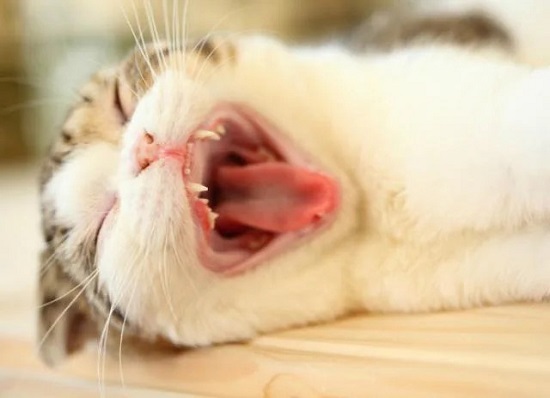
And this condition can also give off a bad smell in your cat’s mouth. The tumors are subtle and hard to notice until they are combined with symptoms such as difficulty in eating, excessive drooling, and weight loss.
As per PetMD, “Melanocytic tumors, which are the third most common oral tumors in cats, arise from a local invasion by neoplastic menlanocytic cells (melanin-producing cells) to the gingival surface. These tumors are usually raised, irregular, ulcerated, have a dead surface, and are highly aggressive and invasive to the bone.“[3]
In addition, felines with mouth tumors won’t even touch their food at times, even though they are ravenously hungry. This is because eating becomes painful for them, as their jaws may get swollen.
Respiratory Infections
Airway or respiratory infections can also lead to bad breath in cats. Your veterinarian can advise you if your kitty cat needs further examination to check for other infections such as FIV and Calicivirus, which can be life-threatening at times.
As with respiratory infections in cats, the diseases can include bronchitis, asthma, and lung diseases related to the feline immunodeficiency virus (FIV).
When to See a Vet?
When it comes to oral hygiene, it is one of the things that is often overlooked in cats, so pay close attention to their breath smell. If you are unsure why your cat’s breath smells unpleasant, you should consult your vet.
A visit to a veterinary hospital is the only way to know for sure what is the cause behind your cat’s bad breath. Not only can your vet figure out the cause of the problem following the bad breath, but the vet can also recommend a treatment plan for your cat if needed.
Never ignore your cat’s unpleasant breath, as this can be a red flag for some other problem that can be a disease or something very serious such as mouth cancer.
Bottom Line
Not every case of bad breath indicates a serious health problem. Instead, it could be something more insignificant; for example, your cat’s breath may smell bad after she gulps down some tuna flakes. So, if you are wondering — why does my cat’s breath stink?; you don’t have to panic.
However, consistent bad breath, on the other hand — can be a sign of any underlying health disorders. In this case, you should consider the wide range of diagnostic options. We recommend that you get your cat examined if bad breath becomes a problem.
References
- Bad breath in cats. (n.d.). MedicineNet. Retrieved September 5, 2022
- Bad breath: Sign of illness? (n.d.). Cornell University. Retrieved September 5, 2022
- Mouth cancer (melanocytic) in cats. (2010, April 14). PetMD. Retrieved September 5, 2022



